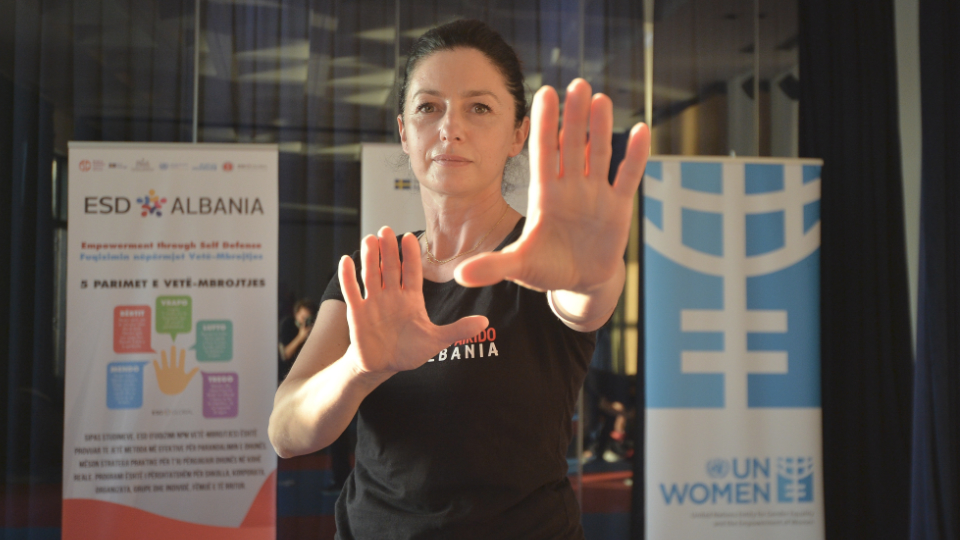Empowering Albanian women and girls to prevent violence and improve their self-confidence
Date:

“My life would have been different if I had done this training when I was 15,” says Deni Sanxhaku, one of the 14 social workers and activists from women’s organizations who took part in a training-of-trainers course on empowerment and self-defense, which many described as “life-changing”.
The training was organized by UN Women in November 2020, in collaboration with Aikido Albania and Empowerment through Self Defense (ESD) Global. As a result, Albania now has its first generation of self-defense instructors who has already started to provide training and support to survivors of violence, as well as to women and girls generally.
“ESD is a connecting bridge, bringing body and mind together, giving power to the voice and courage to the spirit, building solid foundations of a culture of respect and inclusion for diversity in all its forms,” explains Gentiana Susaj, Head Instructor in Albania and Director of ESD Global in Europe, a violence-prevention programme that boosts self-confidence and develops the ability to act in situations of verbal and physical threat.
UN Women partnered for the first time with Susaj during the 16 Days of Activism against Gender-based Violence in 2019, when she provided training on self-defense, personal safety, and how to interrupt and de-escalate violence in different forms to 120 girls and women from different walks of life, including survivors of domestic violence and trafficking.
In addition to leading UN Women’s training-of-trainers course in November, Susaj also delivered a five-week innovative online self-defense training to more than 100 women and girls during the pandemic, with the support of UN Women, under the UN Joint Programme on Eliminating Violence against Women and Girls in Albania, financed by the Swedish Government.
Participant Tonilda Cela said the impact has been palpable: “After completing this training, I feel very strong and able to say NO, with my mind, my voice and my body.”
For Susaj, testimonials like these are a sign that there is growing impact and interest in this area of work: “I know there is an increasing number of women and girls that are asking to take ESD to their communities, and I know that the tools we use in ESD can bring societal change.”
As a trainer, Susaj has been supported by various organizations and programmes. She has trained 600 women and youth so far and wants to incorporate ESD as part of the formal education of all children.
“If girls and boys are taught from early age that abuse is not only wrong, but that one can stand up effectively to it, there will be a change in the society that teaches this. … Children – and all people, for that matter – need to realize that they can change things in the physical world and in the space of relationships, which is where abuse or bullying happens.”
Michele Ribotta, UN Women Representative in Albania, underscores the importance of supporting innovative approaches to violence prevention: “Fighting violence against women requires different tools, from protection services to public awareness and addressing social norms. Women and girls also need to foster their physical and emotional skills to refuse violent relations and to stop them early on. The empowerment and self-defense courses specifically aim to boost their physical and mental safety.”
Susaj adds that this work has not always been easy. In Albania’s traditional patriarchal culture, strong historical and social barriers make cracking gender norms and stereotypes a challenge.
“I was raised by three strong women: my mom, my aunt, and my grandmother. They educated me to be empathic, a good listener and aware of others’ potential. For me, that has been the backbone of my journey at every step, in every project, as a beginner or as a founder or director,” says Susaj.
Her own journey has been tough, yet rich, moving from country to country for the past 20 years (on account of her husband’s work), establishing new networks and relationships from scratch. She is now the only professional head instructor of Aikido and the ESD technique in Albania.
Susaj says leaders cannot wait for ‘the’ big project or position in order to bring change, but do what they can, as soon as they can. “Better Together” is a recent example of that. As soon as COVID-19 hit and Albania went to lockdown in 2020, Susaj managed to bring together and coordinate 60 organizations and institutions for an online platform created to offer information about online services and support available to the population.
Services include response and referrals for individuals in need of psychological counselling, social and legal services; support to families in need of food and other basic needs; and empowerment for resilience webinars and campaigns to support local businesses.
In only three months they managed to support 650 people directly and 2,500 through online counselling, all without dedicated financial support, so fundraising has been part of the initiative.
“The objective was to connect people and institutions in need with those that were able to provide support. I initiated this conversation, as anybody else could have. What is important is that we came together around the notion of the need to help and to do it together.”